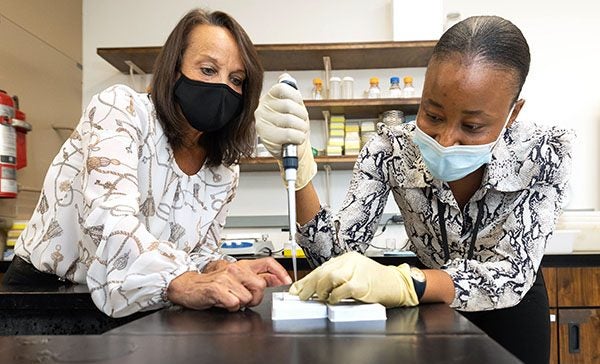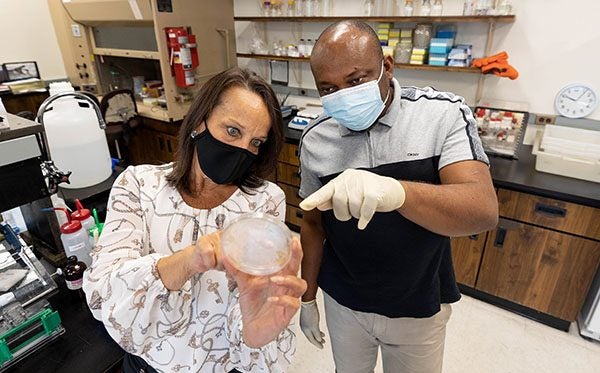ECU researcher explores bacteria behaviors
A professor in the Brody School of Medicine at East Carolina University has received a National Science Foundation (NSF) grant to study the structural and functional properties of bacterial enzyme systems. Understanding how bacteria make metabolic adjustments in order to survive could have implications in drug development.

Dr. Holly Ellis, left, earned a National Science Foundation grant to study bacteria, with implications on future drug development. (Photos by Rhett Butler)
Dr. Holly Ellis, a professor in Brody’s Department of Biochemistry and Molecular Biology, was awarded the $525,000 NSF grant for a project titled, “Coordinated mechanistic approaches to desulfonation in two-component FMN monooxygenases.”
“Bacteria need basic elements in order to survive,” Ellis said. “The bacteria we are investigating are pathogenic (disease-causing) organisms that utilize clever tactics to avoid the host immune response.”
The enzyme system under investigation, Ellis said, enables bacteria to use alternative sulfur sources to remain viable in its host. The overall goal of the project is to determine how distinct structural properties dictate function so researchers can manipulate the properties to modify activity.
“Many of the enzyme systems we are evaluating have medical relevance and would be excellent targets for drug development,” Ellis said. “Some of the outcomes from the proposed studies will answer important questions about enzyme structure and function that can be applied to other enzyme systems. These questions are new concepts, and would change established ideas regarding enzyme structure and function.”
Ellis’ grant award comes during her first year at Brody. She arrived in January 2021 and said the school and department felt like a good fit during visits while she worked on research with Dr. Tonya Zeczycki, assistant professor in the department.
“I obtained my Ph.D. in a biomedical program and had been looking to go back to a medical school. Our projects have a medical focus, and we wanted to establish possible collaborations with both clinicians and researchers in basic medical science,” Ellis said. “While at Auburn, I came to the Brody School of Medicine to run experiments with Dr. Tonya Zeczycki, who is in the same field as me, and was impressed with the department and direction under Dr. (John) Cavanagh. When a position became available, I applied.”
The opportunities for new discoveries in research — and new ways to conduct experiments — keep Ellis motivated and eager to share research experiences with students.

Dr. Holly Ellis and graduate student Chukwuemeka Adindu conduct research at the Brody School of Medicine.
“I am always thinking about the different projects in the lab and working with my graduate students to design new approaches to answer specific questions,” she said. “With the advent of new methodologies, we can approach questions that had previously been beyond our possibilities. The faculty in the department, guided by Dr. Cavanagh, have built up the infrastructure with state of the art equipment that opens new research avenues and educational training for investigators within the department and at ECU.”
Cavanagh, professor and chair of the Department of Biochemistry and Molecular Biology, said Ellis’ arrival at Brody signals departmental strength that spans research and education.
“Not only is she widely known for her excellent research work, but she’s just as renowned for her teaching exploits and nurturing of students. At her previous institution I don’t think there was one teaching or student recognition award she hadn’t won, year after year,” he said. “ I also believe that it wasn’t all luck, and that the department and the school was a genuinely attractive home for her. We have lots of terrific equipment for folks to get excited about, but we have an even better sense of family and spirit of collaboration, and that combination is very attractive to anyone from the outside.”
Those collaborations are key to Ellis’ work.
“We have been working on this system since I began my independent career, but it has led to many unexpected twists and turns that have evolved as we have identified new aspects of the system,” she said. “I was able to bring three of my graduate students with me to ECU, and they did a terrific job of setting up the lab. I think we were all a little surprised that there was minimal lag time in getting our lab set up.”
Ellis also credits Richele Thompson in Dr. Cavanagh’s lab and Zeczycki for their help with the initial lab setup, she said, and Ethel White and Sherelle Hunt ensured that her transition to Brody went smoothly.
That spirit of partnership and support lends itself to the future of Ellis’ research.
“My research goal over the next year is to establish collaborations that can broaden our research scope,” Ellis said. “The Brody School of Medicine has an open collaborative network that will allow our research program to expand in a new direction.”